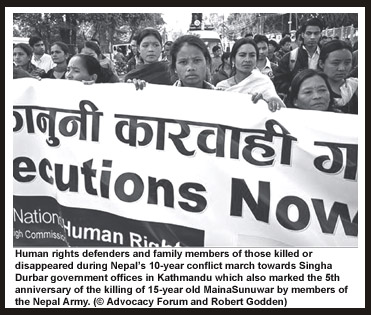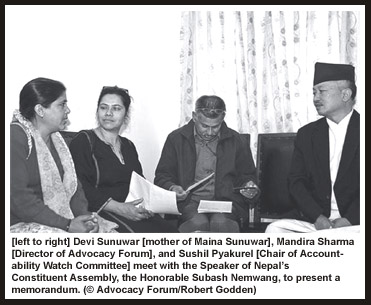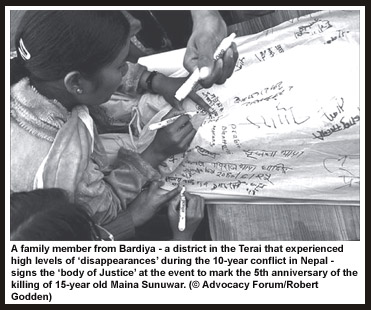A glimmer of hope offered by the government’s
initiative to make public a draft bill for the formation of a Commission
on Disappearance eventually turned out to be a sheer anticlimax with an
unexpected second thought on 5 February 2009 by the cabinet to form the
aforesaid commission via an ordinance. Among other things, the passing of
the disappearance ordinance to form a Commission on Disappearances has
served as a major blow towards efforts by all parties concerned in
investigating and making public the whereabouts of thousands of Nepali
citizens who have disappeared over the decade-long armed conflict.
Although, the argument is that this ordinance would actually expedite the
process of establishment of the Disappearance Commission and help bring
the peace process to a ‘meaningful conclusion,’ there are issues of
greater importance which must be paid attention to before taking to this
road.
 The
basic theory behind passing an ordinance is to enforce legislation during
a parliamentary recess to deal with some emergency situations or address
some issues of prime importance. Passing of ordinances as such are not an
undemocratic phenomenon but it is also critical, in the event of such
situations that the government honors the sanctity of such ordinances
while drafting them so that they will not turn out to be apples of
discord. However, the government has failed to observe both of these
niceties and other issues while issuing the disappearance ordinance.
The
basic theory behind passing an ordinance is to enforce legislation during
a parliamentary recess to deal with some emergency situations or address
some issues of prime importance. Passing of ordinances as such are not an
undemocratic phenomenon but it is also critical, in the event of such
situations that the government honors the sanctity of such ordinances
while drafting them so that they will not turn out to be apples of
discord. However, the government has failed to observe both of these
niceties and other issues while issuing the disappearance ordinance.
First, the government has itself made the circumstances
extenuating. The draft bill for the formation of a Disappearance
Commission was unveiled on 15 November 2008 and was simultaneously
approved by the Cabinet four days later. The parliamentary session was
running smoothly then and continued for the next one month and a half. But
the government, for unknown reasons, did not table it for endorsement.
Following the adjournment of the parliamentary session, the government
sent the ordinance to the president on 10 February 2009 for the seal of
assent.
The reasons put forward by the government in connection
with the ordinance move are to expedite the process of establishment of
the Disappearance Commission and to help bring the peace process to a
‘meaningful conclusion. ’Such justifications are surely not bona fide
as the government surprisingly shrugged off the issue by not tabling it in
the parliament. In the midst of this, the Constituent Assembly (CA)
Speaker and the Chairman of National Human Rights Commission (NHRC) flatly
denied, citing the ordinance as not bearing democratic temper, assuming
their designated role as panelists in the selection committee for
commissioners.
 Second,
the ordinance is fraught with many flaws and gaps. It is an inchoate
instrument with a number of provisions and sections not on par with
international standards. There are neither provisions regarding the issue
of deliberate disappearance nor on clarity about the investigating
authority. A number of human rights organizations had put forward their
suggestions regarding these deficiencies when the ordinance was still a
draft. Moreover, these organizations had also raised concerns over the
ordinance’s legitimacy.
Second,
the ordinance is fraught with many flaws and gaps. It is an inchoate
instrument with a number of provisions and sections not on par with
international standards. There are neither provisions regarding the issue
of deliberate disappearance nor on clarity about the investigating
authority. A number of human rights organizations had put forward their
suggestions regarding these deficiencies when the ordinance was still a
draft. Moreover, these organizations had also raised concerns over the
ordinance’s legitimacy.
The government’s passing of laws and forming of
commissions via ordinances only a few days after the legislative
parliament was adjourned beget serious questions on its intentions. These
moves cannot be justified under any circumstances let alone in the name of
the peace process, especially given that the commissions formed in the
past without any public consultations have failed to deliver outputs
vis-à-vis their objectives and have only led to the further
institutionalization of impunity in Nepal. Hence, it is of utmost
importance that we rectify the mistakes of the past which have, to a
certain extent, contributed to the problems faced by the country. It is
important that we set a positive precedent whereby we follow a proper
process which is democratic and which leads to a sustainable and
meaningful peace in the country.
Moreover, several problems have surfaced in the wake of the ordinance
promulgation. If the commission on disappearances is indeed formed through
the ordinance, the legitimacy of the commission will be at risk. Such then
would be further counterproductive, especially given that the process has
already become controversial and has been criticized not only by national
actors, including the political parties but also international
organizations such as Amnesty International,
Human Rights Watch, International Commission of Jurists and others. The
formation of the peace bodies such as the Disappearance Commission needs
to be discussed widely. There has to be a political consensus for such
bodies to become legitimate and effective. The current political
controversy surrounding the process of introducing the legislation poses
major risks to its effectiveness and legitimacy.
 Now
that the cabinet has passed the ordinance on forming a disappearance
commission and that such ordinance has been approved by the President, it
will still have to be tabled at the next session of the Legislative
Parliament and passed by it. If not passed, it would ipso facto
cease to be effective [Section 88 of the Interim Constitution]. This would
pose serious risks if the House fails to pass this law when it is tabled.
Under such circumstances, the work of the commission during its
functioning with all the efforts to make public the whereabouts of the
disappeared and bring perpetrators to justice would be jeopardized.
Now
that the cabinet has passed the ordinance on forming a disappearance
commission and that such ordinance has been approved by the President, it
will still have to be tabled at the next session of the Legislative
Parliament and passed by it. If not passed, it would ipso facto
cease to be effective [Section 88 of the Interim Constitution]. This would
pose serious risks if the House fails to pass this law when it is tabled.
Under such circumstances, the work of the commission during its
functioning with all the efforts to make public the whereabouts of the
disappeared and bring perpetrators to justice would be jeopardized.
Apparently, there is a catch-22 situation. Even after being tabled in the
parliament, the ordinance needs either to be approved or disapproved. The
Communist Party of Nepal – United Marxist Leninist (CPN-UML), a partner in
the coalition government as well as the main opposition party of the
Nepali Congress had already cried foul over the intentions of the
government vis-à-vis the issuance of the ordinance. If these parties
opposed, the ordinance will automatically be rendered null and void. This
will also help the Maoists, who are claiming that the other parties are
not interested in the formation of a commission, to derelict their
responsibilities. The accruing consequences might lead to an impasse in
the formation of the commission, which will nip the optimism of thousands
of family members of the disappeared in the bud.
The general feeling is that the government intends to form the commission
even before the ordinance is tabled at the next session of the parliament.
We need to take a stance whereby the government starts the process of the
selection and appointment of commissioners and other initial work only
after the ordinance has been tabled and passed by the legislative
parliament. As the functioning and the work of the commission may become
useless if the legislative parliament fails to pass the ordinance, it is a
must that the legislative parliament approves the bill before the major
work starts. Without this, the situation will jeopardize all the efforts
to make public the whereabouts of the disappeared people and give justice
to the victims and their families.
If the government goes ahead and forms the commission
before the ordinance is tabled at the legislative parliament; when the
ordinance is actually tabled (as per section 88 of the interim
constitution) and law makers raise issues with regards to the bill and
discussions start, there are three possible scenarios we may find
ourselves in:
• As discussed earlier, the work of the commission may
become useless if the legislative parliament fails to pass the ordinance.
This will just derail the process of the formation of the Commission and
passing of the law to criminalize disappearances.
• The discussion on the ordinance may last from a week
to months (even if a single member of the parliament disagrees to pass the
bill, it has to be sent to a special committee to be reviewed). Till this
time, the commission may either have already started and accomplished a
major portion of its tasks or has already completed its work. Hence, the
chance to rectify the flaws in the bill and form a commission via a
legitimate process will have been missed.
• Mainly, if formed under such circumstances, it will
also prevent another commission on disappearance to be formed as per
section 38 (2) of the ordinance where it states that no other commission
may be formed to investigate the same cases of disappearances in the
future once a commission has been formed to investigate disappearances.
 Therefore,
there is an urgent need to seek avenues out so that the problem could be
solved through a remedial consensus. One of the easiest ways out of this
possible stalemate is calling for a special session of the parliament to
discuss the ordinance. The interim constitution has a provision whereby
one fourth of the majority can call for a special session of the
legislative parliament. When this option still existed, there was no
reason for the government and the political parties not to invoke this
provision. The government and the political parties should have come to a
consensus to invoke this provision and call for a special session of the
House where the law on disappearances along with other laws can be tabled
and passed after scrutinizing these bills in a democratic manner.
Therefore,
there is an urgent need to seek avenues out so that the problem could be
solved through a remedial consensus. One of the easiest ways out of this
possible stalemate is calling for a special session of the parliament to
discuss the ordinance. The interim constitution has a provision whereby
one fourth of the majority can call for a special session of the
legislative parliament. When this option still existed, there was no
reason for the government and the political parties not to invoke this
provision. The government and the political parties should have come to a
consensus to invoke this provision and call for a special session of the
House where the law on disappearances along with other laws can be tabled
and passed after scrutinizing these bills in a democratic manner.
Further, a substitute ordinance drafted in line with the international
standards can be tabled and discussed in the House. The crucial question
is not whether the ordinance is democratic or not. The commission to be
formed via this ordinance is linked to the future of the victims, who are
waiting with bated breath for a fair hearing of their pain. On all costs,
the victims’ family members should be given the opportunity of selecting
the commissioners. This will not only increase their respect for the
government but also set a good precedent that even an ordinance could be
treated well and subsequently be entrenched in the form of proper
legislation.

 The
basic theory behind passing an ordinance is to enforce legislation during
a parliamentary recess to deal with some emergency situations or address
some issues of prime importance. Passing of ordinances as such are not an
undemocratic phenomenon but it is also critical, in the event of such
situations that the government honors the sanctity of such ordinances
while drafting them so that they will not turn out to be apples of
discord. However, the government has failed to observe both of these
niceties and other issues while issuing the disappearance ordinance.
The
basic theory behind passing an ordinance is to enforce legislation during
a parliamentary recess to deal with some emergency situations or address
some issues of prime importance. Passing of ordinances as such are not an
undemocratic phenomenon but it is also critical, in the event of such
situations that the government honors the sanctity of such ordinances
while drafting them so that they will not turn out to be apples of
discord. However, the government has failed to observe both of these
niceties and other issues while issuing the disappearance ordinance. Second,
the ordinance is fraught with many flaws and gaps. It is an inchoate
instrument with a number of provisions and sections not on par with
international standards. There are neither provisions regarding the issue
of deliberate disappearance nor on clarity about the investigating
authority. A number of human rights organizations had put forward their
suggestions regarding these deficiencies when the ordinance was still a
draft. Moreover, these organizations had also raised concerns over the
ordinance’s legitimacy.
Second,
the ordinance is fraught with many flaws and gaps. It is an inchoate
instrument with a number of provisions and sections not on par with
international standards. There are neither provisions regarding the issue
of deliberate disappearance nor on clarity about the investigating
authority. A number of human rights organizations had put forward their
suggestions regarding these deficiencies when the ordinance was still a
draft. Moreover, these organizations had also raised concerns over the
ordinance’s legitimacy. Now
that the cabinet has passed the ordinance on forming a disappearance
commission and that such ordinance has been approved by the President, it
will still have to be tabled at the next session of the Legislative
Parliament and passed by it. If not passed, it would ipso facto
cease to be effective [Section 88 of the Interim Constitution]. This would
pose serious risks if the House fails to pass this law when it is tabled.
Under such circumstances, the work of the commission during its
functioning with all the efforts to make public the whereabouts of the
disappeared and bring perpetrators to justice would be jeopardized.
Now
that the cabinet has passed the ordinance on forming a disappearance
commission and that such ordinance has been approved by the President, it
will still have to be tabled at the next session of the Legislative
Parliament and passed by it. If not passed, it would ipso facto
cease to be effective [Section 88 of the Interim Constitution]. This would
pose serious risks if the House fails to pass this law when it is tabled.
Under such circumstances, the work of the commission during its
functioning with all the efforts to make public the whereabouts of the
disappeared and bring perpetrators to justice would be jeopardized. Therefore,
there is an urgent need to seek avenues out so that the problem could be
solved through a remedial consensus. One of the easiest ways out of this
possible stalemate is calling for a special session of the parliament to
discuss the ordinance. The interim constitution has a provision whereby
one fourth of the majority can call for a special session of the
legislative parliament. When this option still existed, there was no
reason for the government and the political parties not to invoke this
provision. The government and the political parties should have come to a
consensus to invoke this provision and call for a special session of the
House where the law on disappearances along with other laws can be tabled
and passed after scrutinizing these bills in a democratic manner.
Therefore,
there is an urgent need to seek avenues out so that the problem could be
solved through a remedial consensus. One of the easiest ways out of this
possible stalemate is calling for a special session of the parliament to
discuss the ordinance. The interim constitution has a provision whereby
one fourth of the majority can call for a special session of the
legislative parliament. When this option still existed, there was no
reason for the government and the political parties not to invoke this
provision. The government and the political parties should have come to a
consensus to invoke this provision and call for a special session of the
House where the law on disappearances along with other laws can be tabled
and passed after scrutinizing these bills in a democratic manner.